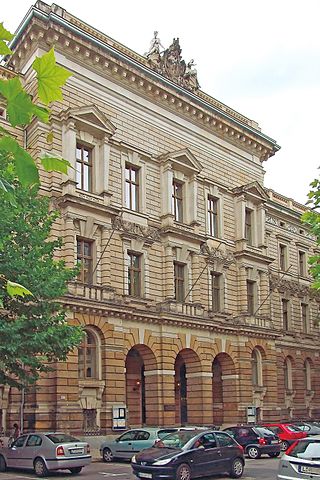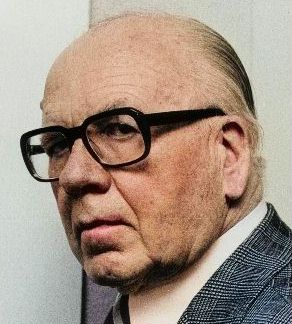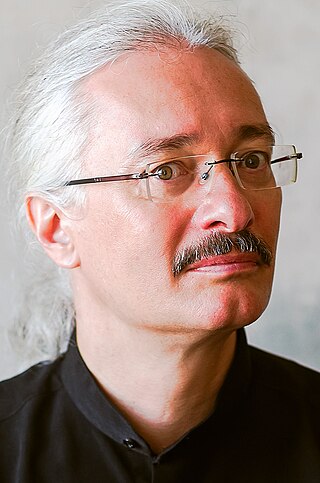Related Research Articles

The University of Music and Theatre "Felix Mendelssohn Bartholdy" Leipzig is a public university in Leipzig, Saxony, Germany. Founded in 1843 by Felix Mendelssohn as the Conservatorium der Musik, it is the oldest university school of music in Germany.

Wolfgang Fortner was a German composer, academic composition teacher and conductor.
Since the 18th century Berlin has been an influential musical center in Germany and Europe. First as an important trading city in the Hanseatic League, then as the capital of the electorate of Brandenburg and the Prussian Kingdom, later on as one of the biggest cities in Germany it fostered an influential music culture that remains vital until today. Berlin can be regarded as the breeding ground for the powerful choir movement that played such an important role in the broad socialization of music in Germany during the 19th century.

Günter Kochan was a German composer. He studied with Boris Blacher and was a master student for composition with Hanns Eisler. From 1967 until his retirement in 1991, he worked as professor for musical composition at the Hochschule für Musik "Hanns Eisler". He taught master classes in composition at the Academy of Music and the Academy of Arts, Berlin. He was also secretary of the Music Section of the Academy of Arts from 1972 to 1974 and vice-president of the Association of Composers and Musicologists of the GDR from 1977 to 1982. Kochan is one of eleven laureates to have been awarded the National Prize of the GDR four times. In addition, he received composition prizes in the US and Eastern Europe. He became internationally known in particular for his Symphonies as well as the cantata Die Asche von Birkenau (1965) and his Music for Orchestra No. 2 (1987). His versatile oeuvre included orchestral works, chamber music, choral works, mass songs and film music and is situated between socialist realism and avant-garde.
Gerhard Wohlgemuth was a German composer and literary editor. He wrote several film scores.
Alfred Thomas Müller is a German conductor, composer and pianist. He won the 1988 Handel Prize presented by the city of Halle.
Michael Wittmann is a German musicologist.
Christoph Sramek is a German music historian and music critic.
Karl Ottomar Treibmann was a German composer and music educator. From 1981 until his retirement in 2001, he was professor of music theory and Tonsatz at the Leipzig University. He was one of the representatives of modernity in the German Democratic Republic, whose great major works can be found in the areas of opera, symphony and chamber music.
Werner Wolf was a German musicologist and music critic. The acknowledged Wagner researcher was co-editor of Sämtlicher Briefe of the composer from 1967 to 1979. He also presented several opera performances. In 1981 he was appointed professor at the Leipzig University.
Siegfried Thiele is a German composer. From 1990 to 1997 he was rector of the University of Music and Theatre Leipzig.
Hans-Christian Bartel was a German violist and composer.
Christian Münch is a German composer, organist, pianist and conductor.
Wolf-Dieter Hauschild was a German conductor, choirmaster, artistic director, composer, harpsichordist and university lecturer.
Günter Neubert was a German composer and tonmeister.
Stephan Stompor was a German musicologist and dramaturg.
Werner Gustav Rudolf Gößling was a German conductor, Choir director, composer and university lecturer. He was chief conductor of the Philharmonisches Staatsorchester Halle and the Robert Franz Singakademie in Halle. In 1951, he was appointed General Music Director. From 1956 to 1958, he built up the first Chinese symphony orchestra in the European style.
Friedrich Schertel was a German cello virtuoso.
Manfred Schubert was a German composer, conductor and music critic.

Stephan König is a German composer, pianist and conductor. He is the musical director of the "LeipJAZZig-Orkester" and the chamber orchestra "artentfaltung" and is considered one of the most authoritative Jazz musicians in Leipzig.
References
- ↑ Musik und Gesellschaft 23 (1973), p. 501.
- ↑ Volkmar Leimert beim Lions Club Chemnitz
- ↑ Mitglieder
- ↑ [url=http://www.rwv-chemnitz.de/pageID_7563005.html%7CRichard-Wagner-Verbandes – Ortsverband Chemnitz]
- ↑ Richard Wagner-Episode X